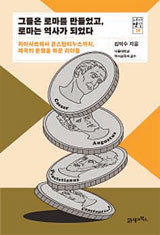How Roman Empire became legend
How Roman Empire became legend
Posted December. 11, 2021 07:14,
Updated December. 11, 2021 07:14

Here is a close look at Caesar, Augustus, Diocletian and Constantine - Roman emperors who left a significant mark in the history of the empire. The author of this book, a history education professor at Seoul National University, sees the four major leaders as the greatest contributors to saving Rome from a state of crisis to lay the foundation for a great empire. Discussions on leadership are included in this book as well to describe how they led an epochal change.
Rome started from a rural community in Italy to go beyond the Mediterranean Sea to reaching Asia and Africa, writing a chapter in world history as one of the most fundamental blocks to Western civilizations. Caesar made great achievements in building a powerful clout across Europe in the early days of Rome. With the Egyptian region set up as a stronghold, the Roman Empire under Caesar’s leadership marched eastward. His growing influence turned him gradually into a reckless dictator, which later gave Brutus a pretext for assassination.
Next, here came Augustus who strengthened the foundation of the empire built by Caesar. He recovered the high status of the Roman Senate. The traces of Roman aqueduct bridges, one of the legacies of his era aimed at ensuring public access to water, are still left across the European continent. Augustus is assessed as a leader who opened up the door to the period of concord called Pax Romana. Diocletian brought peace to end the 50-year era of 18 barracks emperors. Born to a freedman’s family in a region currently part of Croatia, he had a great leadership quality to enable him to overcome a low social status. He divided the empire from east to west and designated vice-emperors. Afterwards, Constantine established the Milan Edict to proclaim Christianity, helping lessen religious discords nationwide. In 324, he chose Byzantium, the region of Istanbul of today, as a new capital city.
Starting from Nanami Shiono’s “Res Gestae Populi Romani: Stories of the Romans” back in the 1990s to various versions of Greek and Roman mythologies in the bookstore, we still love to grab stories dating back a few thousand years. The author says that Rome did the groundwork for democratic republics of our time, adding that 23 percent of South Korean citizens practice Christianity or the established religion of the Roman Empire. “The reason why we still look into Roman history – a deeply rooted pool of knowledge in our mind – is that it provides us the way to go in a new era,” he says. “However, we need to contemplate and answer if the success of the Roman Empire should only be praised from a blinded perspective.”
pep@donga.com
Headline News
- Opposition parties pass amendment to Commercial Act
- Impeachment motions against top officials dismissed
- IU's residence ranked as the nation's most expensive apartment
- K-medicine saves 300 lives in Mongolia through liver transplant skill transfer
- Prisoners in N. Korean camps suffer from torture at minus 30 degrees







